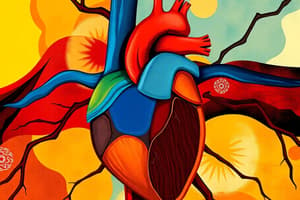Podcast
Questions and Answers
What is the pathophysiology of atrial fibrillation?
What is the pathophysiology of atrial fibrillation?
- Prolonged QT interval on the ECG
- Regular and organized electrical activity in the atria
- Coordinated contraction of the atria
- Chaotic and disorganized electrical activity in the atria (correct)
What are some triggering factors for atrial fibrillation?
What are some triggering factors for atrial fibrillation?
- Low blood pressure, lung disease, anemia
- Hypertension, heart failure, coronary artery disease (correct)
- High cholesterol, diabetes, obesity
- Healthy lifestyle, regular exercise, balanced diet
What is a consequence of atrial fibrillation?
What is a consequence of atrial fibrillation?
- Regular ventricular response, leading to stable cardiac output
- Decreased risk of blood clot formation in the atria
- Irregular ventricular response, leading to variable cardiac output (correct)
- Consistently high heart rate
What are the clinical features of atrial fibrillation?
What are the clinical features of atrial fibrillation?
What is the pathophysiology of Long QT Syndrome?
What is the pathophysiology of Long QT Syndrome?
What is a result of Long QT Syndrome?
What is a result of Long QT Syndrome?
Which type of shock is characterized by decreased afterload and initially increased cardiac output?
Which type of shock is characterized by decreased afterload and initially increased cardiac output?
What is the effect of prolonged QT interval on the risk of arrhythmias?
What is the effect of prolonged QT interval on the risk of arrhythmias?
What is a common genetic mutation associated with congenital Long QT Syndrome (LQTS)?
What is a common genetic mutation associated with congenital Long QT Syndrome (LQTS)?
Which clinical feature is associated with Long QT Syndrome (LQTS)?
Which clinical feature is associated with Long QT Syndrome (LQTS)?
What is the recommended treatment to reduce the risk of arrhythmias in Long QT Syndrome (LQTS)?
What is the recommended treatment to reduce the risk of arrhythmias in Long QT Syndrome (LQTS)?
Which type of shock is caused by impaired cardiac function, often due to myocardial infarction or severe heart failure?
Which type of shock is caused by impaired cardiac function, often due to myocardial infarction or severe heart failure?
Flashcards are hidden until you start studying



